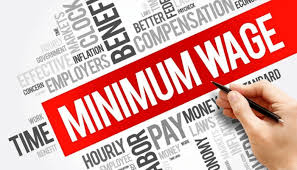
Nigeria’s recent decision to increase the minimum wage from ₦30,000 to ₦70,000 has sparked a mixture of hope and skepticism among workers. While the increment appears significant on paper, the reality is that many Nigerians are struggling to make ends meet even with this new figure. There are several factors that contribute to the difficulties of coping with the increased minimum wage, and understanding these issues can shed light on the broader economic challenges facing the average Nigerian.
1. High Inflation Rates
One of the biggest factors diminishing the impact of the new minimum wage is inflation. Nigeria has faced persistent inflation for years, and recent global events have only made matters worse. Basic necessities such as food, transportation, and healthcare continue to increase in cost, eroding the purchasing power of the naira. By the time most Nigerians receive their monthly wage, they find that it covers fewer goods and services than they expected. Inflation is particularly severe in food prices, with essential staples like rice, beans, and garri becoming increasingly unaffordable for the average family.
2. High Cost of Living in Urban Areas
For those living in urban centers like Lagos, Abuja, and Port Harcourt, the cost of living is extremely high. Accommodation, transportation, and utilities take up a significant portion of monthly expenses, leaving little room for savings or discretionary spending. Even with ₦70,000, it’s often difficult to cover the rent for a modest apartment, especially when additional costs such as electricity, water, and transportation are added. Many Nigerians living in urban areas end up spending more than they earn or are forced to live far from their workplaces to afford cheaper housing, which adds to transportation costs.
3. Unreliable Infrastructure and Additional Costs
Nigeria’s infrastructure challenges place additional financial burdens on its citizens. With unreliable electricity, most households and small businesses have to rely on expensive generators to ensure a steady power supply. Fuel costs add up quickly, especially given the fluctuating prices of petrol. Access to clean water is also an issue, forcing many to buy water from private suppliers or invest in boreholes and water treatment options. In effect, citizens are forced to cover costs that should ideally be taken care of by public utilities, eating away at the already limited resources they have.
4. Healthcare and Education Costs
Another reason why ₦70,000 isn’t enough is the high cost of healthcare and education in Nigeria. Public healthcare facilities are often overcrowded or lack adequate resources, pushing many people to seek care at private hospitals, which charge high fees. Medications and emergency care are expensive and largely out of reach for the minimum-wage earner. Similarly, public education can be underfunded, leaving parents to cover additional fees for textbooks, uniforms, and, in some cases, private tutoring to fill in educational gaps. This is especially challenging for families with more than one child.
5. Dependents and Family Responsibilities
In Nigeria, cultural expectations often require employed individuals to support extended family members, especially in lower-income households. It’s common for minimum-wage earners to be the primary or sole breadwinners for several dependents, which can include spouses, children, siblings, and sometimes parents. When these responsibilities are taken into account, the ₦70,000 minimum wage spreads thinly, with little remaining for personal development, savings, or emergencies.
6. Rising Transportation and Food Costs
Transportation costs are also a major issue for minimum wage earners. In the absence of an efficient public transportation system, many Nigerians rely on more costly, informal options such as motorcycles (okadas) and minibuses (danfos). Increases in petrol prices further exacerbate these costs, impacting the affordability of getting to and from work. Additionally, as previously mentioned, food prices have skyrocketed, driven by factors like import dependencies, currency devaluation, and insecurity in farming areas. For many, food takes up more than half of their income, leaving minimal room for other necessities.
7. Limited Job Opportunities and Job Security
Another significant challenge is job insecurity and limited employment opportunities. Many Nigerians work in informal or unstable jobs, where even receiving the minimum wage is not guaranteed. Employers, especially in small businesses, sometimes delay or reduce payments due to economic constraints, putting workers in a difficult situation. This situation also stymies any opportunity for financial growth, career progression, or long-term planning, keeping many Nigerians in a cycle of hand-to-mouth living.
8. Weak Social Security Systems
In many developed countries, minimum wage earners can rely on social welfare systems to supplement their incomes or support basic needs. However, Nigeria’s social security system is weak and often fails to meet the needs of the poorest citizens. There is limited access to unemployment benefits, child support, and other welfare programs, meaning that individuals must rely entirely on their income, even when it falls short of covering basic expenses.
While the increase in Nigeria’s minimum wage to ₦70,000 is a step forward, it is insufficient to meet the rising costs of living for many Nigerians. Addressing the challenges faced by minimum-wage earners requires more than just wage adjustments. It calls for broader economic reforms, including efforts to curb inflation, improve infrastructure, stabilize job markets, and enhance social welfare programs. Until these underlying issues are addressed, many Nigerians will continue to struggle to make ends meet, regardless of how high the minimum wage is set.
